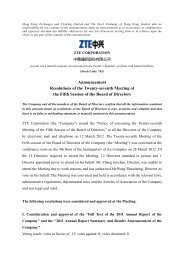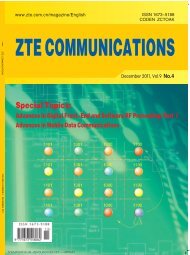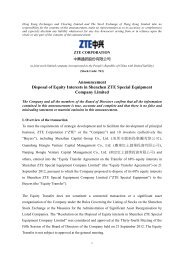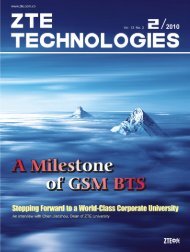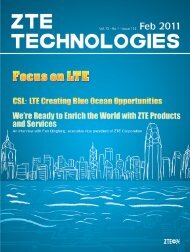- Page 2 and 3:
ImportantThe Board of Directors, Su
- Page 5 and 6:
ANNUAL REPORT 2012DefinitionsIn thi
- Page 7 and 8:
ANNUAL REPORT 2012GlossaryThis glos
- Page 9 and 10:
ANNUAL REPORT 2012Bearer networkCor
- Page 11 and 12:
ANNUAL REPORT 2012Corporate Informa
- Page 13:
ANNUAL REPORT 201210 AuditorsPRCErn
- Page 20 and 21:
ZTE CORPORATIONMajor Events of the
- Page 22 and 23:
ZTE CORPORATIONHighlights of accoun
- Page 24 and 25:
ZTE CORPORATIONHighlights of accoun
- Page 28 and 29:
ZTE CORPORATIONReport of the Board
- Page 30 and 31:
ZTE CORPORATIONReport of the Board
- Page 33 and 34:
ANNUAL REPORT 20125. Breakdown of t
- Page 35 and 36:
ANNUAL REPORT 2012(3) Assets and li
- Page 37 and 38:
ANNUAL REPORT 2012In 2012, the Grou
- Page 39 and 40:
ANNUAL REPORT 2012Details in invest
- Page 41:
ANNUAL REPORT 20122. Liquidity risk
- Page 45 and 46:
ANNUAL REPORT 20123Change in the us
- Page 48 and 49:
ZTE CORPORATIONReport of the Board
- Page 51 and 52:
ANNUAL REPORT 2012Nature Location T
- Page 53 and 54:
ANNUAL REPORT 2012(4) Interest rate
- Page 56:
ZTE CORPORATIONManagement Discussio
- Page 59:
ANNUAL REPORT 2012CAPITAL EXPENDITU
- Page 62:
ZTE CORPORATIONMaterial Matters(I)M
- Page 65 and 66:
ANNUAL REPORT 2012Huawei’s litiga
- Page 67 and 68:
ANNUAL REPORT 2012(11) In May 2012,
- Page 69 and 70:
ANNUAL REPORT 2012(IV)ASSET TRANSAC
- Page 71 and 72:
ANNUAL REPORT 2012(3) Progress of t
- Page 73 and 74:
ANNUAL REPORT 20125. Updates on the
- Page 75 and 76:
ANNUAL REPORT 20125. Status of liab
- Page 77 and 78:
ANNUAL REPORT 2012(VIII) PASSING OF
- Page 79 and 80:
ANNUAL REPORT 2012(XIV) SIGNIFICANT
- Page 81 and 82:
ANNUAL REPORT 2012At the Thirtieth
- Page 83 and 84:
ANNUAL REPORT 2012(4) Creditors and
- Page 85 and 86:
ANNUAL REPORT 2012Ruide will still
- Page 87 and 88:
ANNUAL REPORT 2012A potential suppl
- Page 89 and 90:
ANNUAL REPORT 2012• Pricing and o
- Page 91 and 92:
ANNUAL REPORT 2012Guaranteed partyD
- Page 93 and 94:
ANNUAL REPORT 2012Note 5:It was app
- Page 95 and 96:
ANNUAL REPORT 2012(XVI) UNDERTAKING
- Page 97 and 98:
ANNUAL REPORT 2012Changes in Shareh
- Page 99 and 100:
ANNUAL REPORT 2012(III)ISSUE AND LI
- Page 101 and 102:
ANNUAL REPORT 2012Shareholdings of
- Page 103 and 104:
ANNUAL REPORT 2012Aerospace Guangyu
- Page 105 and 106:
ANNUAL REPORT 2012Directors, Superv
- Page 107 and 108:
ANNUAL REPORT 2012Ms. Qu Xiaohui, b
- Page 109 and 110:
ANNUAL REPORT 2012Ms. Xu Weiyan, bo
- Page 111 and 112:
ANNUAL REPORT 2012Mr. Pang Shengqin
- Page 113 and 114:
ANNUAL REPORT 2012(II)CHANGES IN TH
- Page 115 and 116:
ANNUAL REPORT 2012Name Name of othe
- Page 117:
ANNUAL REPORT 2012Note 7: Ms. Qu Xi
- Page 120 and 121:
ZTE CORPORATIONDirectors, Superviso
- Page 122 and 123:
ZTE CORPORATIONCorporate Governance
- Page 125 and 126:
ANNUAL REPORT 2012III.Information o
- Page 127 and 128:
ANNUAL REPORT 2012Finally, the Audi
- Page 129 and 130:
ANNUAL REPORT 2012With respect to a
- Page 131 and 132:
ANNUAL REPORT 2012(I)Functions of t
- Page 133 and 134:
ANNUAL REPORT 2012regular Board of
- Page 135 and 136:
ANNUAL REPORT 20124. In respect of
- Page 137 and 138:
ANNUAL REPORT 2012e) consider the r
- Page 139 and 140:
ANNUAL REPORT 2012(III)The Audit Co
- Page 141 and 142:
ANNUAL REPORT 2012r) consider the r
- Page 143 and 144:
ANNUAL REPORT 2012(IV)Corporate gov
- Page 145 and 146:
ANNUAL REPORT 2012VIII. Accountabil
- Page 147 and 148:
ANNUAL REPORT 20123. Internal contr
- Page 149 and 150:
ANNUAL REPORT 20122. Statement of t
- Page 151 and 152:
ANNUAL REPORT 2012Report of the PRC
- Page 153 and 154:
ANNUAL REPORT 2012Consolidated Bala
- Page 155 and 156:
ANNUAL REPORT 2012Consolidated Inco
- Page 157 and 158:
ANNUAL REPORT 2012Consolidated Cash
- Page 159 and 160:
ANNUAL REPORT 2012Balance Sheet (co
- Page 161 and 162:
ANNUAL REPORT 2012Statement of Chan
- Page 163 and 164:
ANNUAL REPORT 2012Notes to Financia
- Page 165 and 166:
ANNUAL REPORT 2012Notes to Financia
- Page 167 and 168:
ANNUAL REPORT 2012Notes to Financia
- Page 169 and 170:
ANNUAL REPORT 2012Notes to Financia
- Page 171 and 172:
ANNUAL REPORT 2012Notes to Financia
- Page 173 and 174:
ANNUAL REPORT 2012Notes to Financia
- Page 175 and 176:
ANNUAL REPORT 2012Notes to Financia
- Page 177 and 178:
ANNUAL REPORT 2012Notes to Financia
- Page 179 and 180:
ANNUAL REPORT 2012Notes to Financia
- Page 181 and 182:
ANNUAL REPORT 2012Notes to Financia
- Page 183 and 184:
ANNUAL REPORT 2012Notes to Financia
- Page 185 and 186:
ANNUAL REPORT 2012Notes to Financia
- Page 187 and 188:
ANNUAL REPORT 2012Notes to Financia
- Page 189 and 190:
ANNUAL REPORT 2012Notes to Financia
- Page 191 and 192:
ANNUAL REPORT 2012Notes to Financia
- Page 193 and 194:
ANNUAL REPORT 2012Notes to Financia
- Page 195 and 196:
ANNUAL REPORT 2012Notes to Financia
- Page 197 and 198:
ANNUAL REPORT 2012Notes to Financia
- Page 199 and 200:
ANNUAL REPORT 2012Notes to Financia
- Page 201 and 202:
ANNUAL REPORT 2012Notes to Financia
- Page 203 and 204:
ANNUAL REPORT 2012Notes to Financia
- Page 205 and 206:
ANNUAL REPORT 2012Notes to Financia
- Page 207 and 208:
ANNUAL REPORT 2012Notes to Financia
- Page 209 and 210:
ANNUAL REPORT 2012Notes to Financia
- Page 211 and 212:
ANNUAL REPORT 2012Notes to Financia
- Page 213 and 214:
ANNUAL REPORT 2012Notes to Financia
- Page 215 and 216:
ANNUAL REPORT 2012Notes to Financia
- Page 217 and 218:
ANNUAL REPORT 2012Notes to Financia
- Page 219 and 220:
ANNUAL REPORT 2012Notes to Financia
- Page 221 and 222:
ANNUAL REPORT 2012Notes to Financia
- Page 223 and 224:
ANNUAL REPORT 2012Notes to Financia
- Page 225 and 226:
ANNUAL REPORT 2012Notes to Financia
- Page 227 and 228:
ANNUAL REPORT 2012Notes to Financia
- Page 229 and 230:
ANNUAL REPORT 2012Notes to Financia
- Page 231 and 232:
ANNUAL REPORT 2012Notes to Financia
- Page 233 and 234:
ANNUAL REPORT 2012Notes to Financia
- Page 235 and 236:
ANNUAL REPORT 2012Notes to Financia
- Page 237 and 238:
ANNUAL REPORT 2012Notes to Financia
- Page 239 and 240:
ANNUAL REPORT 2012Notes to Financia
- Page 241 and 242:
ANNUAL REPORT 2012Notes to Financia
- Page 243 and 244:
ANNUAL REPORT 2012Notes to Financia
- Page 245 and 246:
ANNUAL REPORT 2012Notes to Financia
- Page 247 and 248:
ANNUAL REPORT 2012Notes to Financia
- Page 249 and 250:
ANNUAL REPORT 2012Notes to Financia
- Page 251 and 252:
ANNUAL REPORT 2012Notes to Financia
- Page 253 and 254:
ANNUAL REPORT 2012Notes to Financia
- Page 255 and 256:
ANNUAL REPORT 2012Notes to Financia
- Page 257 and 258:
ANNUAL REPORT 2012Notes to Financia
- Page 259 and 260:
ANNUAL REPORT 2012Notes to Financia
- Page 261 and 262:
ANNUAL REPORT 2012Notes to Financia
- Page 263 and 264:
ANNUAL REPORT 2012Notes to Financia
- Page 265 and 266:
ANNUAL REPORT 2012Notes to Financia
- Page 267 and 268:
ANNUAL REPORT 2012Notes to Financia
- Page 269 and 270:
ANNUAL REPORT 2012Notes to Financia
- Page 271 and 272:
ANNUAL REPORT 2012Notes to Financia
- Page 273 and 274:
ANNUAL REPORT 2012Notes to Financia
- Page 275 and 276:
ANNUAL REPORT 2012Notes to Financia
- Page 277 and 278:
ANNUAL REPORT 2012Notes to Financia
- Page 279 and 280:
ANNUAL REPORT 2012Notes to Financia
- Page 281 and 282:
ANNUAL REPORT 2012Notes to Financia
- Page 283 and 284:
ANNUAL REPORT 2012Notes to Financia
- Page 285 and 286:
ANNUAL REPORT 2012Notes to Financia
- Page 287 and 288:
ANNUAL REPORT 2012Notes to Financia
- Page 289 and 290:
ANNUAL REPORT 2012Notes to Financia
- Page 291 and 292:
ANNUAL REPORT 2012Notes to Financia
- Page 293 and 294:
ANNUAL REPORT 2012Notes to Financia
- Page 295 and 296:
ANNUAL REPORT 2012Notes to Financia
- Page 297 and 298:
ANNUAL REPORT 2012Notes to Financia
- Page 299 and 300:
ANNUAL REPORT 2012Notes to Financia
- Page 301 and 302: ANNUAL REPORT 2012Notes to Financia
- Page 303 and 304: ANNUAL REPORT 2012Notes to Financia
- Page 305 and 306: ANNUAL REPORT 2012Notes to Financia
- Page 307 and 308: ANNUAL REPORT 2012Notes to Financia
- Page 309 and 310: ANNUAL REPORT 2012Notes to Financia
- Page 311 and 312: ANNUAL REPORT 2012Supplementary Inf
- Page 313 and 314: ANNUAL REPORT 2012Supplementary Inf
- Page 315 and 316: ANNUAL REPORT 2012Independent Audit
- Page 317 and 318: ANNUAL REPORT 2012Consolidated Stat
- Page 319 and 320: ANNUAL REPORT 2012Consolidated Stat
- Page 321 and 322: ANNUAL REPORT 2012Consolidated Stat
- Page 323 and 324: ANNUAL REPORT 2012Consolidated Stat
- Page 325 and 326: ANNUAL REPORT 2012Statement of Fina
- Page 327 and 328: ANNUAL REPORT 2012Notes to Financia
- Page 329 and 330: ANNUAL REPORT 2012Notes to Financia
- Page 331 and 332: ANNUAL REPORT 2012Notes to Financia
- Page 333 and 334: ANNUAL REPORT 2012Notes to Financia
- Page 335 and 336: ANNUAL REPORT 2012Notes to Financia
- Page 337 and 338: ANNUAL REPORT 2012Notes to Financia
- Page 339 and 340: ANNUAL REPORT 2012Notes to Financia
- Page 341 and 342: ANNUAL REPORT 2012Notes to Financia
- Page 343 and 344: ANNUAL REPORT 2012Notes to Financia
- Page 345 and 346: ANNUAL REPORT 2012Notes to Financia
- Page 347 and 348: ANNUAL REPORT 2012Notes to Financia
- Page 349 and 350: ANNUAL REPORT 2012Notes to Financia
- Page 351: ANNUAL REPORT 2012Notes to Financia
- Page 355 and 356: ANNUAL REPORT 2012Notes to Financia
- Page 357 and 358: ANNUAL REPORT 2012Notes to Financia
- Page 359 and 360: ANNUAL REPORT 2012Notes to Financia
- Page 361 and 362: ANNUAL REPORT 2012Notes to Financia
- Page 363 and 364: ANNUAL REPORT 2012Notes to Financia
- Page 365 and 366: ANNUAL REPORT 2012Notes to Financia
- Page 367 and 368: ANNUAL REPORT 2012Notes to Financia
- Page 369 and 370: ANNUAL REPORT 2012Notes to Financia
- Page 371 and 372: ANNUAL REPORT 2012Notes to Financia
- Page 373 and 374: ANNUAL REPORT 2012Notes to Financia
- Page 375 and 376: ANNUAL REPORT 2012Notes to Financia
- Page 377 and 378: ANNUAL REPORT 2012Notes to Financia
- Page 379 and 380: ANNUAL REPORT 2012Notes to Financia
- Page 381 and 382: ANNUAL REPORT 2012Notes to Financia
- Page 383 and 384: ANNUAL REPORT 2012Notes to Financia
- Page 385 and 386: ANNUAL REPORT 2012Notes to Financia
- Page 387 and 388: ANNUAL REPORT 2012Notes to Financia
- Page 389 and 390: ANNUAL REPORT 2012Notes to Financia
- Page 391 and 392: ANNUAL REPORT 2012Notes to Financia
- Page 393 and 394: ANNUAL REPORT 2012Notes to Financia
- Page 395 and 396: ANNUAL REPORT 2012Notes to Financia
- Page 397 and 398: ANNUAL REPORT 2012Notes to Financia
- Page 399 and 400: ANNUAL REPORT 2012Notes to Financia
- Page 401 and 402: ANNUAL REPORT 2012Notes to Financia
- Page 403 and 404:
ANNUAL REPORT 2012Notes to Financia
- Page 405 and 406:
ANNUAL REPORT 2012Notes to Financia
- Page 407 and 408:
ANNUAL REPORT 2012Notes to Financia
- Page 409 and 410:
ANNUAL REPORT 2012Notes to Financia
- Page 411 and 412:
ANNUAL REPORT 2012Notes to Financia
- Page 413 and 414:
ANNUAL REPORT 2012Notes to Financia
- Page 415 and 416:
ANNUAL REPORT 2012Notes to Financia
- Page 417 and 418:
ANNUAL REPORT 2012Notes to Financia
- Page 419 and 420:
ANNUAL REPORT 2012Notes to Financia
- Page 421 and 422:
ANNUAL REPORT 2012Notes to Financia
- Page 423 and 424:
ANNUAL REPORT 2012Notes to Financia
- Page 425 and 426:
ANNUAL REPORT 2012Notes to Financia
- Page 427 and 428:
ANNUAL REPORT 2012Notes to Financia
- Page 429 and 430:
ANNUAL REPORT 2012Notes to Financia
- Page 431 and 432:
ANNUAL REPORT 2012Notes to Financia
- Page 433 and 434:
ANNUAL REPORT 2012Notes to Financia



